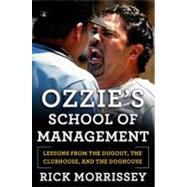
Note: Supplemental materials are not guaranteed with Rental or Used book purchases.
Purchase Benefits
What is included with this book?
Rick Morrissey is an award-winning sports columnist for the Chicago Sun-Times, and he has previously worked at the Chicago Tribune, the Rocky Mountain News, and the Charlotte Observer. He has covered most of the major events in sports, from the Super Bowl to the Olympics to the NBA Finals. He lives in the Chicago area.
"Morrissey writes with verve and much humor.… Through observing Guillen on and off the field and interviewing him, Morrissey presents a rewarding explication of how this individual operates. Fans… [will] enjoy this expert, fast-paced study."—Library Journal
"Rick Morrissey squarely puts you in the passenger seat of a baseball bus driven by Ozzie Guillen. I expected Ozzie would ignore the speed limit, flip off a cop, and run over a few mailboxes, but I didn’t expect to learn about his wisdom, patience, and sixth sense for the baseball family. I would love to pass on Guillen’s words to my young son, only problem is I have to wait until he is twenty-one."--Doug Glanville, former major-league center fielder and author of The Game from Where I Stand
"Ozzie Guillen is my kind of guy, what you see is what you get, take it or leave it. He is a winner."--Mike Ditka, former head coach of the Chicago Bears
The New copy of this book will include any supplemental materials advertised. Please check the title of the book to determine if it should include any access cards, study guides, lab manuals, CDs, etc.
The Used, Rental and eBook copies of this book are not guaranteed to include any supplemental materials. Typically, only the book itself is included. This is true even if the title states it includes any access cards, study guides, lab manuals, CDs, etc.